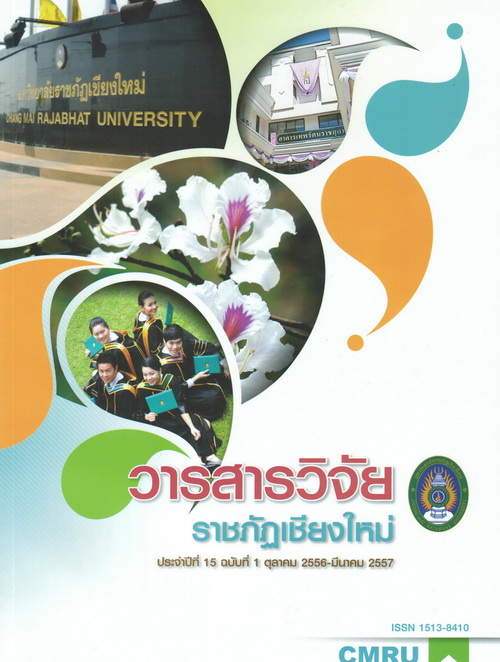ความทุกข์ทางใจในบริบทพุทธธรรม
DOI:
https://doi.org/10.14456/rcmrj.2014.96172Keywords:
ความทุกข์ทางใจ, พุทธธรรม, Psychological distress, , The context of BuddhaAbstract
บทความนี้มีวัตถุประสงค์เพื่อทบทวนและสังเคราะห์เอกสารงานวิจัยที่เกี่ยวข้องกับความทุกข์ทางใจในบริบทพุทธธรรมหรือ “ ความทุกข์” โดยใช้วิธีการทบทวนวรรณกรรมอย่างเป็นระบบ (Systematic Review) จากฐานข้อมลของห้องสมุด จุฬาลงกรณ์มหาวิทยาลัย (http://library.car.chula.ac.th) เอกสารฉบับเต็มในรูปแบบอิเล็กทรอนิกส์ (http://tdc.thailis.or.th)และบทความวิจัยจากต่างประเทศ (www.sciencedirect.com) รวมทั้งแหล่งข้อมูลของหน่วยงานหรือสถาบันที่เกี่ยวข้อง โดยกำหนดคำสำคัญในการสืบค้น (Keyword) งานวิจัยที่เกี่ยวข้อง ได้แก่ “ทุกข์” , “ Suffering and Buddhist” , “ Pain andBuddhist” และ “ Psychology distress and Buddhist” ตามเกณฑ์การคัดเสือกงานวิจัยที่กำหนดขึ้น
ผลจากการศึกษาพบประเด็นสำคัญคือ ความทุกข์ประกอ,บด้วย ทุกข์ประจำหรือสภาวทุกข์ เนื่องจากความทุกข์ชนิดนี้หลีกเลี่ยงไม่ได้ และทุกข์อีกประเภทคือ ทุกข์เบ็ดเตล็ดหรือทุกข์จร ซึ่งเป็นความทุกข์ทางใจที่มาจากเหตุการณ์และสิ่งแวดล้อมของชีวิตที่เกิดขึ้นเพียงชั่วคราว โดยเกิดขึ้นกับแต่ละคนด้วยระดับที่ต่างกันออกไปตามระดับความยึดมั่น ทุกข์จรนี้เกิดจากการที่ตัณหาไม่ได้รับการตอบสนอง ทำให้เกิดความขัดเคืองไม่พอใจ และส่วนหนึ่งแสดงออกมาในลักษณะของอาการทุกข์ได้แก่ ความเศร้าโศก รํ่าไห้รำพัน ความทุกข์จากความเจ็บป่วย ความน้อยใจ และความคับแค้นใจ ด้านแนวคิดหลักที่เกี่ยวข้องกับความทุกข์ทางใจ ได้แก่ ไตรลักษณ์ อริยสัจลี่ และปฏิจจสมุปบาท ด้านแนวคิดที่อธิบายสาเหตุแห่งทุกข์ทางใจ ได้แก่ ตัณหากิเลสวัฏฏ์ ในวัฏฏะ 3 และกิเลส สำหรับด้านการศึกษาวิจัยในเรื่องความทุกข์ พบว่าในปัจจุบันมีความพยายามในการศึกษาความทุกข์ทางใจในบริบทพุทธธรรม ทั้งในด้านความหมายและขอบเขต รวมถึงด้านที่เกี่ยวข้องกับสุขภาพและการบำบัดทางจิตมากขึ้น แต่ยังไม่มีงานวิจัยใดที่ศึกษากรอบมโนทัศน์ความทุกข์ทางใจในบริบทพุทธธรรมด้วยการวิจัยเซิงประจักใ5 และยังไม่มีการสร้างเครื่องมือประเมินความทุกข์ทางใจในบริบทพุทธธรรม
PSYCHOLOGICAL DISTRESS IN THE CONTEXT OF BUDDHA
The review paper aimed to examine the existing literature on psychological distress in the context of Buddha or “ Dukkha” through the method of systematic review from the database of Chulalongkorn University’s library (http://library.car. chula.ac.th), electronic full articles (http://tdc.thailis.or.th), academic articles from science direct database and also data from related institutions or organizations. The key words applied to searching engines included “ทุกข์” , “ Suffering and Buddhist” , “ Pain and Buddhist” and “ Psychology distress and Buddhist” according to the inclusion criteria. The findings yielded certain important themes.The important results of the study are suffering consist of Inevitable suffering which is the states of suffering that not be able to escape and Miscellaneous suffering which happens from the events of life and the environment that occur occasionally in human with different levels according to the degree of adherence. Miscellaneous suffering caused by the desires not to respond. It causes frustration which manifests itself in the form of hatred and also symptom of distress such as sorrow, lamentation, feeling from physical pain, grief and despair. The main concepts related to suffering are The Three Characteristics of Universal Natural Law, The Four Noble Truths and The Dependent Origination. The causes of suffering concepts are 3 models. First is craving, second is the triple round of the Dependent Origination and the last is defilements. Academic researches on the subject of psychological distress in context of Buddha, effort to study the meaning and scope, including those related to health and psychological therapy. Nevertheless, there is currently no research on the development of the conceptual framework with empirical study and no assessment tool for psychological distress based on Buddha’s concept.
Downloads
Downloads
How to Cite
Issue
Section
License
1. Articles, information, content, images, etc published in the “Community and Social Development Journal” are copyrighted by the Community and Social Development Journal, Chiang Mai Rajabhat University. In order to properly distribute the articles through print and electronic media, the authors still hold the copyright for the published articles under the Creative Commons Attribution (CC BY) license, which allows the re-distribution of the articles in other sources. References must be made to the articles in the journal. The authors are responsible for requesting permission to reproduce copyrighted content from other sources.
2. The content of the articles appearing in the journal is the direct responsibility of the article authors. The editorial board of the journal does not necessarily agree with or share any responsibility.














